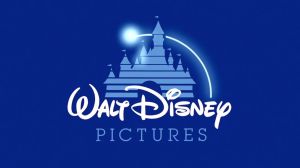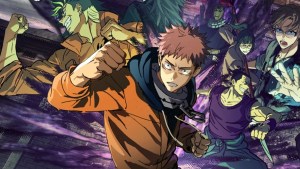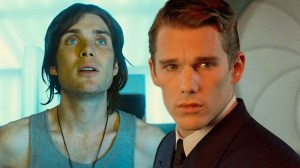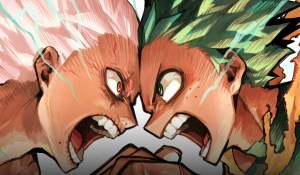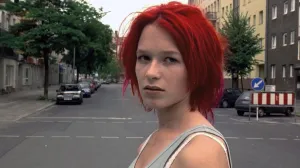The animated movie musical Arlo the Alligator Boy is set to release on Netflix tomorrow, April 16th, and as we said in our review, it’s a delightfully madcap adventure that will likely leave a smile on your face. Ahead of the release, ComicBook.com actually had the opportunity to speak with director Ryan Crego all about the movie, how it came into the world, and the show — I Heart Arlo — that is set to follow it on the streaming service later.
Videos by ComicBook.com
Here’s the synopsis for Arlo the Alligator Boy, in case you haven’t seen it yet:
“Upon learning that he is from New York City, Arlo, a wide-eyed boy who is half human and half alligator, decides to leave his sheltered life in the swamp and search for his long lost father. The animated musical movie, Arlo the Alligator Boy, will launch Arlo’s journey as he meets a group of misfits who quickly become his new family. Once Arlo’s adventure lands him in New York City, the series, I Heart Arlo, will kick off as he and his newfound crew set up shop in an abandoned seaside neighborhood and help bring it back to life.”
As noted above, Arlo the Alligator Boy is set to release on Netflix tomorrow, April 16th. It stars Michael J. Woodard as the voice of Arlo, Mary Lambert as the voice of Bertie, Tony Hale as the voice of Teeny Tiny Tony, Haley Tju as the voice of Alia, Jonathan Van Ness as the voice of Furlecia, Annie Potts as the voice of Edmée, Brett Gelman as the voice of Marcellus, Vincent Rodriguez III as the voice of Ansel Beauregard, Jennifer Coolidge as the voice of Stucky, and Flea as the voice of Ruff. You can check out all of our previous coverage of Netflix right here.
What do you think about what we have seen of Arlo the Alligator Boy so far? Are you excited to check it out tomorrow? Let us know in the comments, or feel free to reach out and hit me up directly over on Twitter at @rollinbishop to talk about all things animation! And keep reading to check out our full interview with Crego!
The following interview was lightly edited for length and clarity.
On Why Arlo at All
ComicBook.com: This is a bit of an interesting movie, a different movie. Why Arlo? Why this movie for you at this time?
Ryan Crego: Well, it’s funny because it’s a story that I’ve been working on, or at least, I shouldn’t say that I’ve been working on the entire time, but over a decade old with me. It’s something that’s just kind of been there for the last 10, 11 years.
I started out as a storyboard artist. I do a lot of sketching and in most of my writing, there are sketches. He just was a character that kind of popped out of me from early sketches and way back when I thought, “Man, this would be really cool.” I started to build the world a little bit, build the characters around him, then put a pitch together that wasn’t so successful. [laughs] It took about six or seven years in between to come back to it, dust it off, get it back into a fighting shape. Around the same time, I was just rolling off a project. Had been working with Netflix on that and thought they would be the right people to bring it to. Sure enough, they went for it.
On Musicals

Was Arlo always going to be a musical?
The initial intention was always to do something musical. It was definitely a musical when I pitched it to Netflix. I found myself growing up around music, musicians, playing in bands, touring, and doing all that stuff. Then really buckled down into the animation part of my career, the last 10 years or so.
As I was putting this pitch back together, I really thought like, “Man, I feel like there’s something to do here, something musical and something that maybe, will be a little bit different than what we’re used to seeing in the animated musical.” Just trying to not completely destroy and tip the genre upside down but to do something that just felt fresh, fresh, cool, and fun. I really dove head-first into the musical part of things. At the same time, I was writing the script and didn’t really know what I was doing, which was a blessing, more of a blessing than a curse. I think there was real intuition and discovery in the process.
I had a great writing partner, Alex Geringas, who was our composer and my songwriting partner. We had a lot of discussions about the story and how these songs work. Just finding the songs and then attaching them to the story or finding the story points and then discovering a song for that moment. It’s a very fluid process. I really am in love now more than ever with making musicals.
When I started this project, I was like, “This is a musical for sure.” “I don’t know of everything having to do with a musical.” But after finishing this project, I can’t wait. I can’t wait to get back in and write more songs and make another story built around songs. I got a bug for it.
On the Movie’s Themes
The movie deals with a lot of serious themes of inequality and class and being different and how that can be its own strength. Was that something that came out of turning into a musical or was that always part of it?
Yeah, I think in his story, what’s always been there, is the idea of this ever-optimist character that we all strive to be. Wanting to create a character who is truly, truly good. Not just good because the audience has to believe that he’s doing the right thing or that we have to cheer for him or her or whatever. There’s some kind of protagonist tricks you can pull when you’re writing.
But I wanted to create a character that felt honestly and genuinely positive and good, and put that character in a world that felt a little bit more real. A little bit more like the world that we know, which is a lot of flawed characters, a little bit more gritty. Things don’t always end up working out the way that we hoped that they would and then see how that character then deals with those challenges in that story and along that journey.
That I think, was always the driver of the character. Was just that, he’s everything that we want to be as an audience member or as a human being. He looks at everyone and everything with so much positivity and an optimism that they have something to offer. He sees these people around him or these characters around him, who maybe have lost a little bit of that, their compasses are turned around and he’s a really great grounding rod for them. Also, when he gets into his most challenging times, the things that he’s done through that optimism for those people, when he’s starting to lose that, they can return that to him. That was always the story for me.
It really shows up in the relationship between Arlo and Bertie. She’s got so many walls up and she’s so hard to get to, it’s hard to get to her center. We know underneath it all, that there’s something, she needs this connection with Arlo. That’s part of the fun for me is the discovery of that relationship. I could watch that relationship unfold over and over again. A plot, you can always go, “OK, then they made it to this point and they fought the bad guys and then they won. It’s victory.”
But when it comes to emotional stories, I think that’s where I really connect. Where it’s Arlo and Bertie, I’m kind of in love with that relationship and just how they support each other and the nuances of it. So well portrayed by Mary Lambert and Michael J. Woodard, who really brought the characters to life and helped me even create the characters to a point, maybe more than they know. I was so inspired by their ability to become these characters. I started taking that back into the writing because we’re always, in animation, sort of polishing along the way. Unlike live-action where you write the script and you go out and shoot, then maybe you do some re-shoots. With animation, we’re tweaking and touching up all the way down the process until the very last minute when you can, and re-recording lines and stuff. They were a big inspiration in the characters.
On the Cast

This is a pretty wild cast with Woodard, Lambert, and Rodriguez, lots of star power, if not headliners from the musical world. More like folks just to the side of the spotlight. It’s like a showcase — “you should be paying attention to these people” — which I feel is in line with the concept of Arlo itself. Can you talk a bit more about working with the rest of cast?
I mean, so lucky. When I look at the cast document, headshots and all that, I just go, “Man, I can’t believe this.” that we got all these people on board and feel so lucky. I think Mr. Rodriguez is a great example of someone who brings a totally different set and personality that really matches the character of Ansel Beauregard. Vincent is such a well-trained and well-thought actor and musical theater actor. He brought a whole different level of performance that was really, really fun. Micheal has a ton of stage experience, but he really is, up to this point, mostly a singer with a little bit of acting here and there. Mary was diving deeper into acting, but she’s also this kind of artist like this songwriting, poet, artist, and then Vincent is someone who’s just so powerfully connected to the stage, to theater, and to performance.
They all just have these kinds of superpowers. Then you’ve got Jonathan Van Ness playing Furlecia who was just such a thrilling person to be involved in the project. He has so much energy, positivity, and insight. He even helped create the character, Furlecia. That was a character that I wanted to make sure that we got it, we approached it right, we approached it as, not sensitively. I wanted it to be fun and all of that. You don’t want to take someone like Jonathan Van Ness and then create a stereotype and ask them to play a stereotype when you’ve got somebody who’s that original. It made sense for us to go to Jonathan and say, “Hey, we have this really fun idea. This is the idea. Are you interested in collaborating?” From character design, to treatment, through pronouns, to dialogue, everything Jonathan weighed in on, it became a part of the process. That was so incredible.
I’m an open collaborator. I want people to have a voice, I want people to come in, I want all the good stuff to rise to the top. We’ll use it. I don’t ever feel like it has to be one vision all the time. I know there are some extremely, extremely talented people who can do that. I’m not one of them. I’m a much more of like bringing a bunch of really talented people to the room and let’s figure out how to make it all work kind of a director. Jonathan was amazing.
Then Brett Gelman, who plays Marcellus the fish man. A lot of people know him from Stranger Things and from Fleabag. He’s an incredible actor. He’s so funny and of anyone, I think in the cast, makes me laugh harder. Every record that I’ve recorded with him, I think I’ve cried some. It’s not that I don’t laugh, I laugh. Something about that man, he just breaks me up. The funniest character for me is Marcellus.
Tony Hale, who I’ve worked with before, who I think is just so fun, he’s got a ton of energy, he’s a perfect Teeny, Tiny Tony. He was exactly what we needed for that. Going into some of the peripheral cast, Flea and the Red Hot Chili Peppers, who is just like a complete childhood hero of mine, did not disappoint. Not only was he super, super kind, sweet, and encouraging about the whole process in the story, but he just delivered so much with that character of Ruff. He was so much fun to work with.
Jennifer Coolidge, who’s like a master at improv. A lot of the stuff that you hear is just Jennifer riffing in the room and me figuring out how to use it later. Then Annie Potts, she’s legendary. Anyone who grew up in the Ghostbusters era would know. That was so cool to work with her. Getting her to sing the Happy Birthday song was one of the highlights of making this movie. I think that song was totally insane and asking anyone to do it is just crazy but asking Annie Potts to do it and just watching her tackle it and wrestle that song to the ground, she was so fun. It was one of the best days recording that song with her.
On Working Through a Pandemic

I feel a lot of people don’t understand that sometimes there’s a pretty lengthy process, especially for animation productions. I have to ask, did the pandemic affect production at all? And if so, how?
Yeah, totally. But you know what was interesting? We had such a resilient group. We made the movie with a studio called Titmouse Animation Studios. They have a couple locations. They were really responsible for the production from top to bottom. Netflix picked up and helped me develop and sort of get it off the ground. I took the project to Titmouse because I had worked with them in the past and I just had such admiration for their studio and thought, if anyone can pull off a hand-drawn feature, even the time constraints that we had and all this sort of limitations that we were looking at, I was like, “I think they can do it.”
We really put our heads together to try to figure out what’s the best path to do that. When we got to the point of the pandemic, when things start to hit a wall, I have to really give it up to just the passion and organization of that studio and the artists that work there because everyone was so resilient. It took us about a week or two to put our heads together. “What’s our new process, right? How do we share information? How do we get all of these gigantic finals rendered? How do we get all these things to the editors? How did the editors have identical backups?” There’s a lot of technical issues to work out. I think that was the trickiest part from a creative standpoint. I don’t think we missed too much. I think a lot of the animators at that point were pretty deep in.
The story was done and the animation was really gearing up in our processes. We also have these people who work in after effects, are really pulling it all together, giving us all the beautiful effects, and the look of everything. Those artists are used to working at home, doing freelance work, being a little more isolated maybe, than some of the story artists who are pitching and sharing a lot more. It happened at a time in the process where we were able to handle it pretty well. The group at Titmouse just figured out how to make it so everyone can still plow forward.
We lost a little bit of a step, but I think in the end we probably only delayed the release of the movie by six weeks, which I think is pretty incredible, considering what we’ve all lived through over the last year or plus. We all know what a big deal it was and how kind of crazy it was. I just think that we came out of it. It was really nice to have something, this project in particular, to have something positive and fun and funny to work on. We got in our animation dailies and we’re all laughing and sharing and on screens. We kept each other’s spirits up. It ended up being really a fun process. I wish we were there in person every day and I could stand over an animator’s shoulder and see work in progress and say, “Oh my gosh, that’s so neat.” In the end, I feel very fortunate that we got to do what we got to do and continue our work. I think it kept a lot of us focused and moving at a time when things were very uncertain.
On I Heart Arlo
The movie, like you said, leads into a show, I Heart Arlo, that you’re working on now — what can you tell us about the show?
So the show is a continuation of the characters’ journey, I would say. It picks up right after the movie, it’s probably, I don’t know, a few months maybe, it’s hard to say. It’s musical, it’s really funny, it’s super sweet. I’ve worked on a lot of movies where you have an ensemble cast. The cast are usually so funny and so cool and you’re just like, “Oh, I just want to spend time with that character.” And the movie doesn’t offer you that chance to do that because of the time constraints and because your story leans towards a single protagonist most of the time.
This is really a chance for us to spend time with all of these characters and have these wonderful little moments. It’s not a ton of big action, big plot, big journey type stuff, it’s really much more centered around the relationships that these characters, how they’re moving on beyond once the story ends in the movie. For Arlo, he’s got a lot, still, a lot of discovery ahead of himself. He’s gone on this big journey, traveled from the swamp to New York, which felt massively large for that character and now he’s started coming into his own a little bit and getting to learn more about how he handles relationships with people around him. To me, it’s like a bunch of short little character moments with songs. I think it’s super charming and really, really funny. Hopefully, people who fall in love with the characters’ movie will get to experience it, get to continue to enjoy that as they get into the series.

